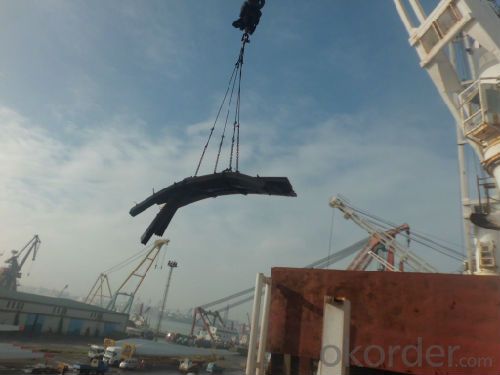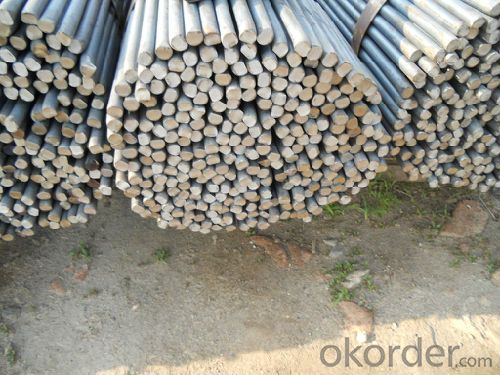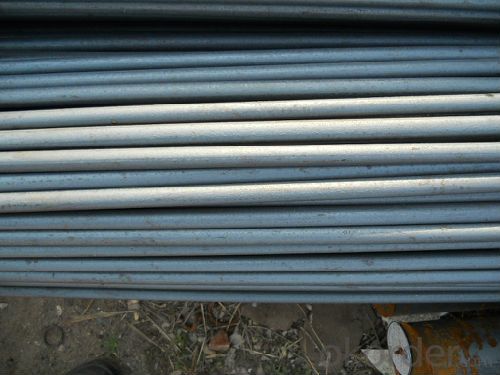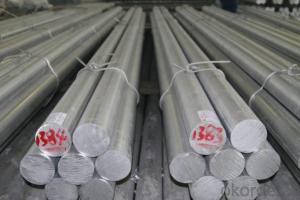Hot Rolled Steel Round Bar SGS Certificate Lower Price SAE 1018
- Loading Port:
- Tianjin
- Payment Terms:
- TT or LC
- Min Order Qty:
- 30 m.t.
- Supply Capability:
- 27000 m.t./month
OKorder Service Pledge
OKorder Financial Service
You Might Also Like
Product Description:
OKorder is offering Hot Rolled Steel Round Bar SGS Certificate Lower Price SAE 1018 at great prices with worldwide shipping. Our supplier is a world-class manufacturer of steel, with our products utilized the world over. OKorder annually supplies products to European, North American and Asian markets. We provide quotations within 24 hours of receiving an inquiry and guarantee competitive prices.
Product Applications:
Hot Rolled Steel Round Bar SGS Certificate Lower Price SAE 1018 are ideal for structural applications and are widely used in the construction of buildings and bridges, and the manufacturing, petrochemical, and transportation industries.
Product Advantages:
OKorder's Hot Rolled Steel Round Bar SGS Certificate Lower Price SAE 1018 are durable, strong, and resist corrosion.
Main Product Features:
· Premium quality
· Prompt delivery & seaworthy packing (30 days after receiving deposit)
· Corrosion resistance
· Can be recycled and reused
· Mill test certification
· Professional Service
· Competitive pricing
Product Specifications:
1. Material: Alloy structural steels, carbon structure steels, alloy tool and model steels,etc.
2. Process: EAF + LF + VD + Forged + Heat Treatment (optional)
3. Delivery condition:Hot forged +Rough machined (black surface after Q/T)+ Turned (optional)
4.Technical Data: Chemical Composition, Physical Properties and Mechanical Testing.
5. Test: Ultrasonic test according to SEP 1921-84 3C/c.
Chemical Composition:
C | Si | Mn | P | S | Cr | |
45Cr | 0.42-0.49 | 0.17-0.37 | 0.6-0.9 | Max0.035 | Max0.035 | 0.3 0.4 |
S45C | 0.42-0.48 | 0.15-0.35 | 0.6-0.9 | Max0.030 | Max0.035 | |
1045 | 0.43-0.5 | 0.15-0.35 | 0.6-0.9 | Max0.030 | Max0.050 |
Packaging & Delivery of Hot Rolled Steel Round Bar SGS Certificate Lower Price SAE 1018
1. Packing: it is nude packed in bundles by steel wire rod
2. Bundle weight: not more than 3.5MT for bulk vessel; less than 3 MT for container load
3. Marks:
Color marking: There will be color marking on both end of the bundle for the cargo delivered by bulk vessel. That makes it easily to distinguish at the destination port.
Tag mark: there will be tag mark tied up on the bundles. The information usually including supplier logo and name, product name, made in China, shipping marks and other information request by the customer.
If loading by container the marking is not needed, but we will prepare it as customer request.
4. Transportation: the goods are delivered by truck from mill to loading port, the maximum quantity can be loaded is around 40MTs by each truck. If the order quantity cannot reach the full truck loaded, the transportation cost per ton will be little higher than full load.
5. Delivered by container or bulk vessel
FAQ:
Q1: Why buy Materials & Equipment from OKorder.com?
A1: All products offered byOKorder.com are carefully selected from China's most reliable manufacturing enterprises. Through its ISO certifications, OKorder.com adheres to the highest standards and a commitment to supply chain safety and customer satisfaction.
Q2: How do we guarantee the quality of our products?
A2: We have established an advanced quality management system which conducts strict quality tests at every step, from raw materials to the final product. At the same time, we provide extensive follow-up service assurances as required.
Q3: How soon can we receive the product after purchase?
A3: Within three days of placing an order, we will begin production. The specific shipping date is dependent upon international and government factors, but is typically 7 to 10 workdays.
Q4: What makes stainless steel stainless?
A4: Stainless steel must contain at least 10.5 % chromium. It is this element that reacts with the oxygen in the air to form a complex chrome-oxide surface layer that is invisible but strong enough to prevent further oxygen from "staining" (rusting) the surface. Higher levels of chromium and the addition of other alloying elements such as nickel and molybdenum enhance this surface layer and improve the corrosion resistance of the stainless material.
Q5: Can stainless steel rust?
A5: Stainless does not "rust" as you think of regular steel rusting with a red oxide on the surface that flakes off. If you see red rust it is probably due to some iron particles that have contaminated the surface of the stainless steel and it is these iron particles that are rusting. Look at the source of the rusting and see if you can remove it from the surface.
Images:



- Q:How do steel round bars perform under torsion or twisting forces?
- The exceptional performance of steel round bars in resisting torsion or twisting forces is widely recognized. Thanks to their inherent strength and stiffness, steel round bars can endure high levels of torque without experiencing significant deformation or failure. When subjected to torsion, steel round bars display what is known as elastic behavior. Initially, the bar will twist and deform elastically, meaning it will revert to its original shape once the twisting forces are no longer applied. This elastic deformation is directly proportional to the magnitude of the applied torque, in accordance with Hooke's law. However, if the torsional forces surpass the elastic limit of the steel round bar, it will undergo plastic deformation. This entails the permanent twisting of the bar, preventing it from returning to its original shape after the forces are released. The extent of plastic deformation depends on the magnitude and duration of the torsional forces. The high tensile strength of steel round bars makes them highly resistant to torsional failure, enabling them to withstand substantial twisting forces. Moreover, the round bars' smooth and uniform surface reduces the likelihood of stress concentrations, further enhancing their torsional performance. It is crucial to note that the torsional performance of steel round bars can be influenced by various factors, such as alloy composition, heat treatment, and manufacturing processes. By carefully selecting appropriate steel grades and employing suitable processing techniques, the torsional strength and performance of steel round bars can be further optimized to meet specific application requirements.
- Q:Are steel round bars suitable for high-temperature applications?
- Steel round bars can be suitable for high-temperature applications depending on the specific grade and composition of the steel. Certain grades of steel, such as stainless steel or heat-resistant alloys, are specifically designed to withstand high temperatures without losing their mechanical properties. These steel grades have high melting points, excellent heat resistance, and good oxidation resistance, making them ideal for applications in industries such as aerospace, automotive, and power generation. Stainless steel round bars, for example, exhibit excellent corrosion resistance and high strength at elevated temperatures. They can withstand temperatures up to 800-900 degrees Celsius without significant loss of mechanical properties. Additionally, heat-resistant alloys like Inconel or Hastelloy are used in extreme high-temperature environments, such as gas turbines or petrochemical plants, where temperatures can exceed 1000 degrees Celsius. However, not all steel round bars are suitable for high-temperature applications. Carbon steels, for instance, are prone to oxidation and loss of strength at elevated temperatures. Low-grade steel round bars may also experience deformation, softening, or even failure under high-temperature conditions. Therefore, it is crucial to select the appropriate steel grade and consult with experts or engineers to determine the suitability of steel round bars for specific high-temperature applications.
- Q:Can steel round bars be used in the production of gears?
- Yes, steel round bars can be used in the production of gears. Steel round bars are often used as a raw material in gear manufacturing due to their high strength, durability, and ability to withstand heavy loads and high temperatures. The round bars can be machined or forged into the desired gear shape, ensuring precise dimensions and accurate teeth profiles. Steel round bars also offer excellent wear resistance and can be heat-treated to further enhance their mechanical properties, making them a suitable choice for various types of gears, including spur gears, helical gears, bevel gears, and worm gears.
- Q:Can steel round bars be used for making gears?
- Certainly! Gears can indeed be made using steel round bars. The reason for their widespread use in gear manufacturing lies in their outstanding strength, longevity, and ability to withstand damage. These bars can be processed, subjected to heat treatment, and molded into different types of gears, including spur gears, helical gears, and bevel gears. Steel round bars provide exceptional accuracy and dependability, making them ideal for applications demanding durable and high-performing gears, like automotive transmissions, industrial machinery, and power transmission systems.
- Q:Can steel round bars be used for making gates?
- Yes, steel round bars can be used for making gates. Steel round bars are strong and durable, making them suitable for gate construction. They can be welded together to create a sturdy gate frame, and can also be used for decorative elements or as pickets. Additionally, steel round bars can be easily customized and shaped to fit the desired gate design.
- Q:Are steel round bars suitable for use in the construction industry?
- Yes, steel round bars are commonly used in the construction industry due to their strength, durability, and versatility. They provide structural support in various applications such as reinforcement in concrete, framing, and the creation of beams and columns. Additionally, steel round bars can be easily fabricated, welded, and formed into different shapes, making them a suitable choice for a wide range of construction projects.
- Q:Why is the round bar bent?
- In fact, the stress and deformation complex around reinforced concrete, bond stress varies with grip length of the rebar so bond strength with steel type, shape and position of the embedded in concrete, different direction and change, is also related to concrete strength, concrete compressive strength the higher the strength, the bond strength is generally determined by R=P/3.14dL. P for pullout force, D, rebar diameter, L, steel embedment length.
- Q:What are the different surface roughness options for steel round bars?
- There are several different surface roughness options available for steel round bars. These options are typically determined by the manufacturing process and the desired end-use of the steel bars. 1. Hot Rolled: Hot rolled steel round bars have a rough and scaled surface finish. This is due to the high temperature at which the bars are formed, which causes the surface to oxidize and form a layer of scale. This roughness can vary depending on the specific manufacturing process. 2. Cold Drawn: Cold drawn steel round bars are processed at room temperature, resulting in a smoother surface finish compared to hot rolled bars. The cold drawing process involves pulling the steel bars through a die to reduce their diameter, resulting in a more uniform and consistent surface roughness. 3. Peeled and Polished: Peeled and polished steel round bars undergo a secondary process to remove the outer layer of scale or surface defects. This process typically involves peeling the outer layer and then polishing the surface to achieve a smoother and more refined finish. This option provides a high-quality surface with minimal imperfections. 4. Ground: Ground steel round bars are processed through a grinding machine to achieve a precise and smooth surface finish. This process removes any surface defects and irregularities, resulting in a consistent and uniform surface roughness. Ground bars are often used in applications where dimensional accuracy and a smooth surface are required. 5. Turned and Polished: Turned and polished steel round bars are processed on a lathe machine, where the outer layer is removed by turning the bars against a cutting tool. This process results in a smooth and polished surface finish. Turned and polished bars are commonly used in applications where aesthetics and a high-quality surface finish are important. Overall, the choice of surface roughness option for steel round bars depends on the specific requirements of the application. Factors such as dimensional accuracy, surface finish, and aesthetics play a role in determining the most suitable option for a given use case.
- Q:Can steel round bars be plated with other metals?
- Yes, steel round bars can be plated with other metals. Plating is a process in which a thin layer of one metal is applied to the surface of another metal. This is commonly done to enhance the appearance of the steel round bar or to provide it with additional properties such as corrosion resistance or improved conductivity. The plating process involves immersing the steel round bar in a solution that contains ions of the desired metal. Through the use of electrical currents or chemical reactions, the metal ions are deposited onto the surface of the steel, forming a thin and uniform coating. Popular metals used for plating steel round bars include nickel, chrome, zinc, and copper. Plating is a versatile and cost-effective method to improve the performance and aesthetics of steel round bars for various applications.
- Q:Can steel round bars be used in the shipbuilding industry?
- Steel round bars have a wide range of applications in the shipbuilding industry. They are commonly used for constructing hulls, decks, bulkheads, and other structural components. The reason for their popularity lies in their exceptional strength, durability, and resistance to corrosion, which makes them well-suited for withstanding the harsh marine environment. In terms of fabrication, steel round bars can be easily welded, machined, and formed according to desired shapes, offering flexibility in ship construction. Furthermore, their availability in various sizes and grades allows for customization to meet specific shipbuilding requirements. Ultimately, steel round bars play a vital role in the shipbuilding industry due to their robustness and reliability.
1. Manufacturer Overview |
|
|---|---|
| Location | |
| Year Established | |
| Annual Output Value | |
| Main Markets | |
| Company Certifications | |
2. Manufacturer Certificates |
|
|---|---|
| a) Certification Name | |
| Range | |
| Reference | |
| Validity Period | |
3. Manufacturer Capability |
|
|---|---|
| a)Trade Capacity | |
| Nearest Port | |
| Export Percentage | |
| No.of Employees in Trade Department | |
| Language Spoken: | |
| b)Factory Information | |
| Factory Size: | |
| No. of Production Lines | |
| Contract Manufacturing | |
| Product Price Range | |
Send your message to us
Hot Rolled Steel Round Bar SGS Certificate Lower Price SAE 1018
- Loading Port:
- Tianjin
- Payment Terms:
- TT or LC
- Min Order Qty:
- 30 m.t.
- Supply Capability:
- 27000 m.t./month
OKorder Service Pledge
OKorder Financial Service
Similar products
New products
Hot products
Related keywords































